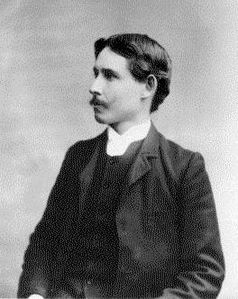Analysis of The City at the End of Things
Archibald Lampman 1861 (Upper Canada) – 1899 (Ottawa, Canada)
Beside the pounding cataracts
Of midnight streams unknown to us
'Tis builded in the leafless tracts
And valleys huge of Tartarus.
Lurid and lofty and vast it seems;
It hath no rounded name that rings,
But I have heard it called in dreams
The City of the End of Things.
Its roofs and iron towers have grown
None knoweth how high within the night,
But in its murky streets far down
A flaming terrible and bright
Shakes all the stalking shadows there,
Across the walls, across the floors,
And shifts upon the upper air
From out a thousand furnace doors;
And all the while an awful sound
Keeps roaring on continually,
And crashes in the ceaseless round
Of a gigantic harmony.
Through its grim depths re-echoing
And all its weary height of walls,
With measured roar and iron ring,
The inhuman music lifts and falls.
Where no thing rests and no man is,
And only fire and night hold sway;
The beat, the thunder and the hiss
Cease not, and change not, night nor day.
And moving at unheard commands,
The abysses and vast fires between,
Flit figures that with clanking hands
Obey a hideous routine;
They are not flesh, they are not bone,
They see not with the human eye,
And from their iron lips is blown
A dreadful and monotonous cry;
And whoso of our mortal race
Should find that city unaware,
Lean Death would smite him face to face,
And blanch him with its venomed air:
Or caught by the terrific spell,
Each thread of memory snapt and cut,
His soul would shrivel and its shell
Go rattling like an empty nut.
It was not always so, but once,
In days that no man thinks upon,
Fair voices echoed from its stones,
The light above it leaped and shone:
Once there were multitudes of men,
That built that city in their pride,
Until its might was made, and then
They withered age by age and died.
But now of that prodigious race,
Three only in an iron tower,
Set like carved idols face to face,
Remain the masters of its power;
And at the city gate a fourth,
Gigantic and with dreadful eyes,
Sits looking toward the lightless north,
Beyond the reach of memories;
Fast rooted to the lurid floor,
A bulk that never moves a jot,
In his pale body dwells no more,
Or mind or soul,—an idiot!
But sometime in the end those three
Shall perish and their hands be still,
And with the master's touch shall flee
Their incommunicable skill.
A stillness absolute as death
Along the slacking wheels shall lie,
And, flagging at a single breath,
The fires shall moulder out and die.
The roar shall vanish at its height,
And over that tremendous town
The silence of eternal night
Shall gather close and settle down.
All its grim grandeur, tower and hall,
Shall be abandoned utterly,
And into rust and dust shall fall
From century to century;
Nor ever living thing shall grow,
Nor trunk of tree, nor blade of grass;
No drop shall fall, no wind shall blow,
Nor sound of any foot shall pass:
Alone of its accursèd state,
One thing the hand of Time shall spare,
For the grim Idiot at the gate
Is deathless and eternal there.
| Scheme | AXAABCBCDEFEGHGHIJIJKLKLXMXMNONODPDPQGQGRSRS XXXDTUTUQVQVWXWXXXXSJYJYZPZPEFEF1 J1 J2 3 2 3 4 G4 G |
|---|---|
| Poetic Form | |
| Metre | 0101010 1110111 1100101 010111 100100111 11110111 11111101 01010111 110101011 11110101 10110111 01010001 1101011 01010101 01010101 11010101 01011101 110101000 01000101 10010100 11111100 01110111 11010101 001010101 11110111 010100111 01010001 11011111 01010101 01011001 11011101 01010001 11111111 11110101 01110111 010001001 01110101 1111001 11111111 0111111 11100101 111100101 11110011 11011101 1111111 01111101 11010111 01011101 1101011 11110011 01111101 11011101 11110101 110011010 11110111 010101110 01010101 01001101 11001011 01011100 11010101 01110101 01110111 11111100 1100111 11001111 01010111 111 0101011 0101111 01010101 010110101 01110111 01010101 01010101 11010101 111011001 11010100 00110111 11001100 11010111 11111111 11111111 11110111 0111111 11011111 101100101 1100101 |
| Closest metre | Iambic tetrameter |
| Characters | 3,094 |
| Words | 552 |
| Sentences | 13 |
| Stanzas | 2 |
| Stanza Lengths | 44, 44 |
| Lines Amount | 88 |
| Letters per line (avg) | 27 |
| Words per line (avg) | 6 |
| Letters per stanza (avg) | 1,179 |
| Words per stanza (avg) | 275 |
Font size:
Submitted on May 13, 2011
Modified on April 29, 2023
- 2:46 min read
- 152 Views
Citation
Use the citation below to add this poem analysis to your bibliography:
Style:MLAChicagoAPA
"The City at the End of Things" Poetry.com. STANDS4 LLC, 2024. Web. 28 Apr. 2024. <https://www.poetry.com/poem-analysis/3687/the-city-at-the-end-of-things>.


Discuss this Archibald Lampman poem analysis with the community:
Report Comment
We're doing our best to make sure our content is useful, accurate and safe.
If by any chance you spot an inappropriate comment while navigating through our website please use this form to let us know, and we'll take care of it shortly.
Attachment
You need to be logged in to favorite.
Log In